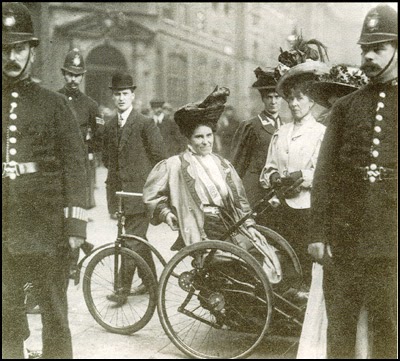The Women's Suffrage campaigner Rosa May Billinghurst was
born into a middle class family in Lewisham in 1875. At five months
old, she contracted an illness – almost certainly polio – which left her
completely paralysed. Despite some recovery,
she was left paraplegic, relying on calipers and crutches to walk, and usually
resorting to a three wheeler wheelchair which was pedalled by hand. Despite these difficulties, she was as stalwart a political campaigner as any contemporary disability movement activists.
Like prototype social workers,
May and her sister Alice worked on the streets with prostitutes, in the
Greenwich workhouse, and in a Sunday School.
Politically, May started out as a member of the Women’s Liberal
Association, but radicalized by her experiences of community work, she joined the militant
suffragette Women’s Social and Political Union in 1907. Her family donated money to the cause,
but May was to put her own body on the line.
Always on her tricycle,
decorated with WSPU ribbons and banners, she participated in the suffragette
march to the Albert Hall on 13 June 1908, distributing leaflets advertising the
forthcoming Hype Park demonstration. In
July, she worked for the WPSU at the Haggerston by-election. This included teaching local children
suffragist songs. Two years later, she
founded the Greenwich branch of the WPSU. As a result of all her activities, she became known as “the cripple suffragette”, and her disability led to increased publicity for the campaign.
May repeatedly came into
contact with the police and the authorities.
In November 1910, she was thrown out of her tricycle during the “Black
Friday” demonstration, and the police pushed her down a side street and removed
the valves from her tyres. She was one of 159 women arrested that day. Another suffragette wrote later how,
“I remember hearing
startling stories of her running battles with the police. Her crutches were
lodged on each side of her self propelling invalid chair, and when a meeting
was broken up or an arrest being made, she would charge the aggressors at a
rate of knots that carried all before her.”
A year later, May was
arrested again in Parliament Square and sentenced to five days in prison for
obstructing the police. In March 1912,
she was sentenced to one month’s hard labour in Holloway Prison after smashing
windows as part of the WPSU campaign:
she had hidden the stones for flinging at windows under the rug over her
legs.
In December that year, she
was sentenced to eight months in prison, after being found guilty of firebombing
Deptford pillar boxes. This was part of the WPSU campaign which the
government claimed destroyed more than 5,000 letters.
On this last occasion, she
went on hunger strike, and was forcibly fed, causing damage to her teeth and general health. In the Fawcett Women’s Library,
there are many letters sent on her behalf by family members and fellow
campaigners, objecting to her being force fed.
As a result of this pressure, she was ordered to be released by the Home
Secretary after two weeks in prison.
By March 1913, she had recovered sufficiently to be able
to speak about her experiences at a meeting in West Hampstead. In June of that year she took part in the funeral
procession for Emily Wilding Davison – the suffragette who had flung herself at
the King’s horse at the Derby and been trampled to death. In her invalid tricycle as always, May wore
white. On 21 May 1914, she chained
herself and her chair to the railings as Buckingham Palace as part of another
WPSU protest. It was on this occasion that Sylvia Pankhurst recalled her being flung out of her chair by
two policemen.
Once the First World War
broke out, WPSU suspended campaigning, and members were released from
prison. May supported Christabel
Pankhurst’s Smethwick election campaign in 1918, the year that the
Qualification of Women Act was passed.
After women's suffrage had been achieved, May ceased to
be so politically active and little more is known of her. She seems to have lived in
Sunbury on Thames, Surrey and to have had an adopted daughter. She died on September 4, 1953.



Hi! I found really interesting this post so i wanted to ask for permission to translate it to spanish. I'm from Argentina and I want more people from my country to be able to read it (not only those who can read in english).
ReplyDeleteThanks!
Pilar